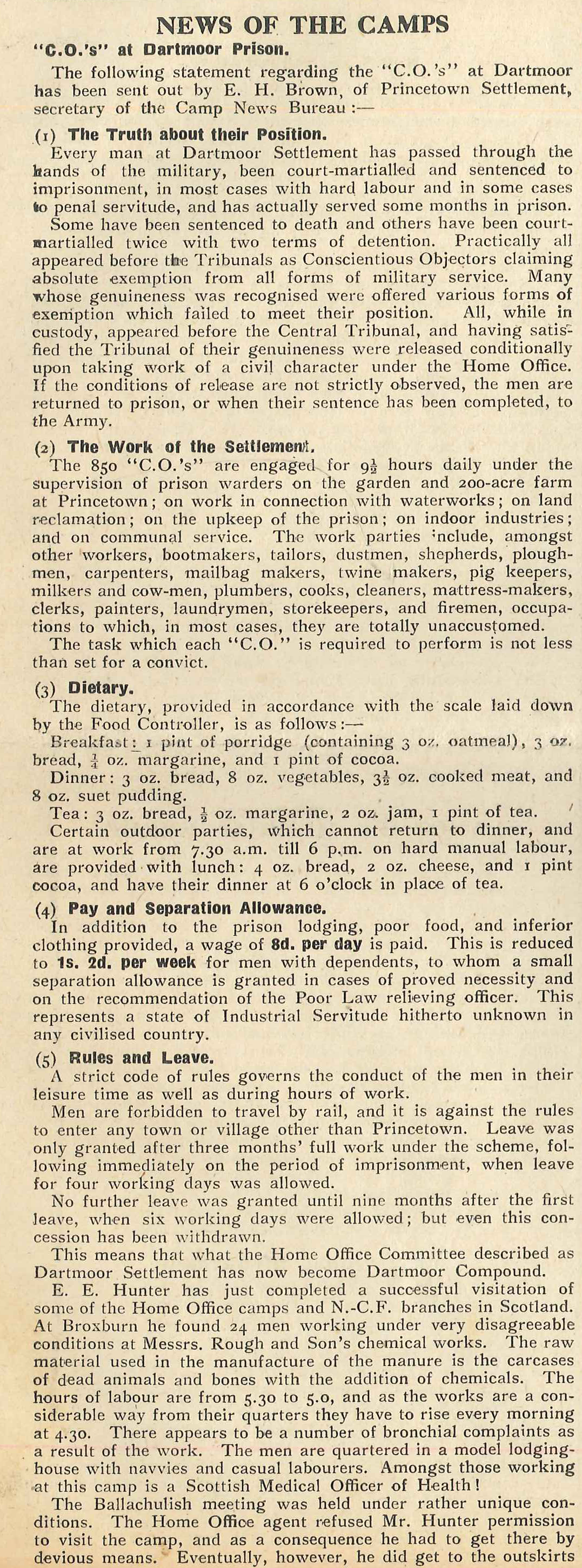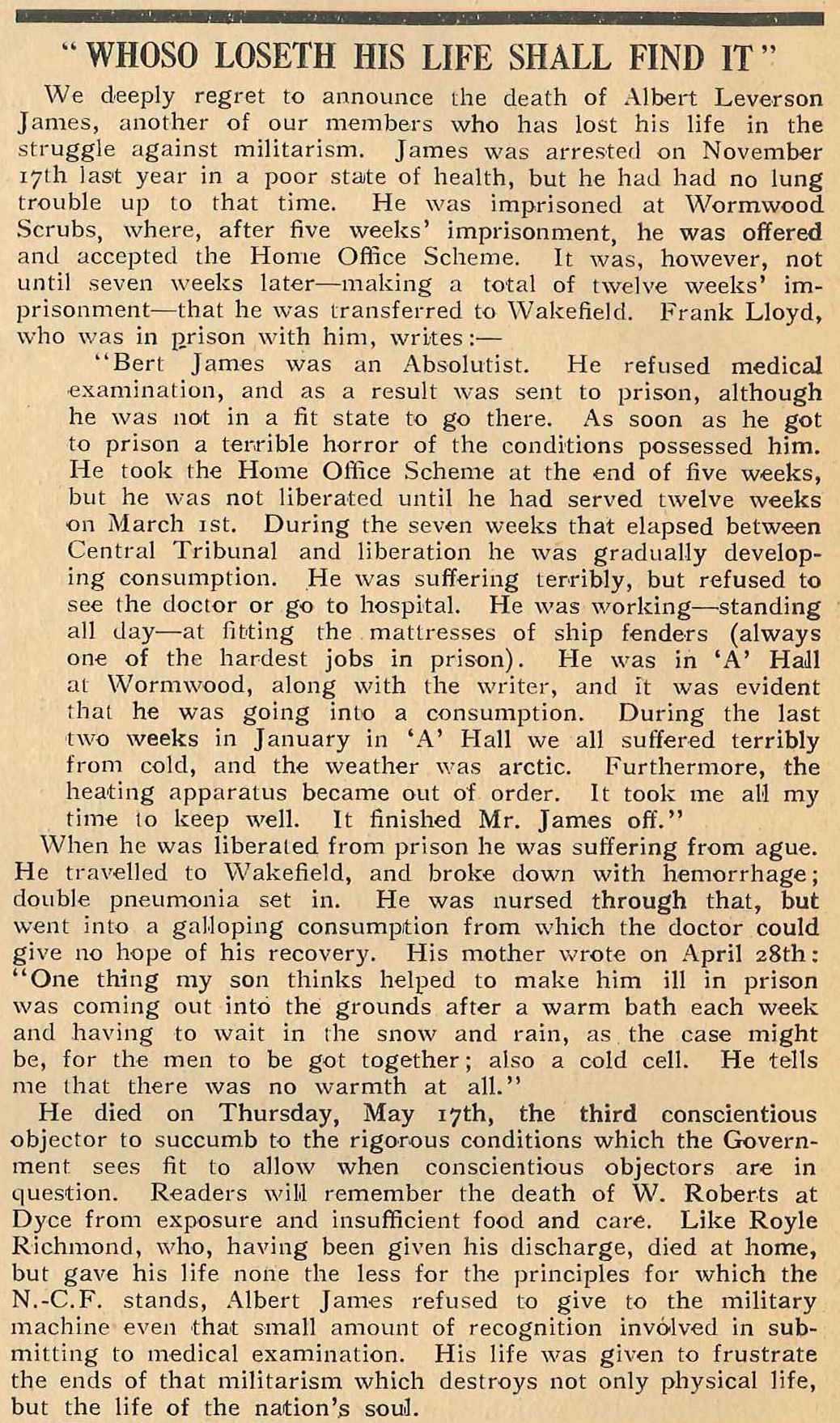
| HOME | TRIBUNAL HOME |
With international conditions settling down, May of 1917 saw The Tribunal return to a more familiar and immediate subject - the condition of work camps and prisons holding Conscientious Objectors.
3rd May 1917
The month immediately begins with news of the No-Conscription Fellowship National Committee Meeting, gathering to asses the previous year’s activities in addition to deciding on new ways for the NCF to operate. The meeting focused primarily on the Home Office Scheme, which, though it had been running for several months, was still operating questionably, with little oversight and virtually no clarity as to the rights and responsibilities of the men who took it up. Men had accepted the Home Office Scheme and found themselves in work camps, but with no idea of how they were supposed to operate. What rights did they have and what could they reasonably expect in terms of treatment?
The National Committee resolved to make the workings of the HoS a priority in coming months, but also recorded successes. The most striking was winning a valuable concession regarding COs on the second and subsequent prison sentences. Standard entry procedure in Edwardian prisons was to confine incoming prisoners to solitary confinement for a period of weeks. Understanding the mental torment this subjected prisoners to, and the likelihood of many COs being forced to undergo multiple sentences, the NCF campaigned for this practice to be ended. The success of this campaign, however, was limited, with The Tribunal periodically asking in the following weeks and months that members inform Head Office of solitary confinement suffered by Conscientious Objectors on second or third sentences and reminding them that “such action by prison authorities, while not actually contrary to regulations, is in most cases contrary to undertakings which have been given”.
The National Committee could not always achieve a consensus on important matters. One of the most pressing and difficult issues was the legitimacy of work and hunger strikes in prison and on the Home Office Scheme. The NCF line was still unclear - to rule out calling on strikes as a corporate body, but to support individuals who took it up. At this stage, the ambivalence of the party line on strikes was difficult to explain and the ambiguous position would have comforted few.
10th May 1917 - News from the Camps
 With the view from Head Office unclear and the nature of the Home Office Scheme still uncertain, updates on the situation from the work camps were sorely needed. Keeping the readership up to date with news and explaining the life of COs on the HoS allowed The Tribunal to shape a consensus on how the NCF should stand on the HoS. However it was portrayed would push the readership, and gradually the whole NCF, into a particular stance - harsh and punitive or a better alternative to prison - one that despite the National Committee’s neutral stance, the editors of The Tribunal, bitterly opposed to the Home Office Scheme, had already decided upon. Consequently, the News from the Camps tends towards the depressing - dwelling on meagre rations, harsh conditions and the statement that “Dartmoor settlement has become Dartmoor compound”.
With the view from Head Office unclear and the nature of the Home Office Scheme still uncertain, updates on the situation from the work camps were sorely needed. Keeping the readership up to date with news and explaining the life of COs on the HoS allowed The Tribunal to shape a consensus on how the NCF should stand on the HoS. However it was portrayed would push the readership, and gradually the whole NCF, into a particular stance - harsh and punitive or a better alternative to prison - one that despite the National Committee’s neutral stance, the editors of The Tribunal, bitterly opposed to the Home Office Scheme, had already decided upon. Consequently, the News from the Camps tends towards the depressing - dwelling on meagre rations, harsh conditions and the statement that “Dartmoor settlement has become Dartmoor compound”.
Aside from the attempts of the staff of The Tribunal to sway public opinion, articles like this one provide a valuable insight for the historian. The day-to-day life of the men who took up the HoS is poorly known through official sources, and the May 10th article shows us the kinds of occupations men were engaged upon, as well as throwing valuable light on the conditions and regulations that shaped their lives. With information on the Home Office Scheme scattered between many different archives, “News from the Camps” is both rare and exceptionally useful.
25th May 1917 “Whoso Loseth his life shall find it”
It must have been heartening for many at The Tribunal to go some months without the sad duty of writing an obituary for a CO comrade, but sadly, May 1917 saw the death of Albert Leverson James. His obituary in this month’s Tribunal is, as always, tragic yet resolute. Another lost comrade, but another reason to carry on the struggle. Albert’s story can be found on our Remembering the Men Who Said No project site.
In the same issue, the National Committee came hard on the heels of Albert’s death, with a resolution levelled against the conditions and treatment that cost him his life. After the deliberation and ambiguity earlier in the month, the National Committee resolved to oppose the “penal character” of the Home Office Scheme, not the scheme itself. This would mean campaigning for better conditions and better work for COs on the scheme, while leaving the nature of the scheme - the defacto imprisonment of COs with no limits on their incarceration - unchallenged. This would seem to be a National Committee decision taken independently of the editorial staff of The Tribunal, who vehemently opposed the scheme. The division in the movement echoes that of 1916 over Absolutists and Alternativists and shows The Tribunal pursuing an ever more restricted view of what the “correct ideology” was for the movement.
In months to come, these divisions would become ever more apparent, but in May 1916 The Tribunal and the movement as a whole seemed poised for a return to action on behalf of the Conscientious Objectors it represented.
<
